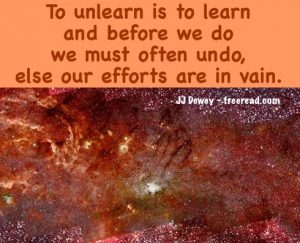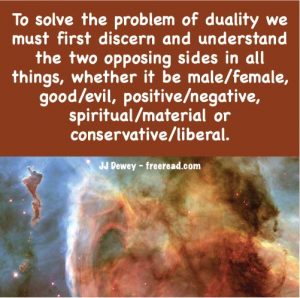
Chapter Three –
The Second Division
Slavery Is Freedom, Or Maybe
Ask anyone if he is for freedom and he will say, “yes, of course.”
It is interesting that everyone in the universe sees himself as a supporter of freedom. Hitler saw himself as fighting for freedom. Terrorists claim to fight for freedom. Southern slaveholders fought the Civil War in the name of freedom. One of those freedoms was the freedom to continue to hold slaves, which they thought was essential to their own financial freedom. Lincoln found himself perplexed at such an odd view of this sacred right.
Most communist revolutionaries who enslaved their people saw themselves as fighting for freedom. Fidel Castro presented himself as a freedom fighter.
So, are all people really for freedom? If so, who is left that is restricting freedom and enslaves so much of the world? Surely, there must be quite a few people out there who are against freedom or there would not be so many restrictions and so much tyranny in the world.
Just as in the first chapter we illustrated that the general public is deceived as to what a Democrat and Republican is, this chapter will attempt to illustrate a second important fallacy, which is that most people do not understand what freedom is. This misunderstanding of freedom is another great illusion that is dividing America and the world.
One of the reasons for the great division boils down to an extension of the division of the feeling and thinking nature. Some believe they are for freedom because that which they support makes them feel free. Others see freedom as that which seems to be a logical application of the principle as they see it.
Both groups can be totally wrong. Feeling you support freedom does not make you right, as feelings are often illogical. Thinking you support freedom can also be illusionary, as many have gaps in their reasoning process.
Before we can proceed, the question must be asked: what is freedom? In other words, how can we ascertain who really is for freedom and who it is that thinks he is for it, but is deceived?
First, we need to identify why any person, even he who embraces an enslaving ideology, sees himself as an advocate for freedom.
The reason for this is simple. No matter how flawed the system of government, there are always a few who will benefit, even if it is on the backs of the vast majority.
Castro, for instance, fought the revolution in Cuba in the name of freedom and now the nation is enslaved. Was Castro wrong? Not from his point of view. He fought for freedom and now he is one of the freest men in the world. He can do whatever he wants. He even has the freedom to execute or imprison all those who oppose him. He has the freedom to impose his will on any of his subjects. He has the freedom to speak his mind without fear of repercussion. From a warped way of looking at it, that is more freedom than any American has.
Let us call this the Castro Principle of Freedom, which is illustrated as follows: “I am free if I get my way. To hell with anyone else who feels his freedoms are trampled on.”
By this principle, the slave owners could proclaim they were fighting for freedom: “I am free because slavery frees up my time and makes me money, giving me the freedom to do as I please.”
Now, when the average person looks at these examples he may smile, nod his head and agree that there are ignorant people indeed who swallow the Castro Principle. Fortunately, he thinks he is far removed from such harmful thinking. But is he? We shall see.
It is obvious to the thinking person that true freedom is much more than freedom for a handful of people at the expense of the many. Let us, therefore, give a more universal definition.
True freedom occurs not when a few are able to act according to their will at the expense of the many, but when the maximum possible number of people in a group or nation are able to act according to their wills, as long as they are not directly harming others.
Incorporated in true freedom would be the ability to access, without restriction, our individual homes. Not included within the principle would be the ability of a burglar to access your home and to take what he pleases. The total freedom of a few burglars would mean a lack of freedom for the many. The burglar believes in the Castro Principle of freedom. The homeowner, on the other hand, exercises the True Principle of Freedom.
Now, it seems as if the difference between the True Principle and the Castro Principle of Freedom is very obvious, that all but a few very selfish people would know it when they see it, but such is not the case. When it comes down to a choice between the benefit for the few at the expense of the many versus the benefit of the whole, most will choose the benefit of the few if they are among the few who benefit.
When a person is one of the few, the temptation is great to believe that he is on the side of true freedom, even if his choice enslaves the many.
Why is this?
Because human nature tends first to look at what benefits us as individuals, and, more often than not, ignores the problems suffered by others. A person has to consciously stretch his heart and mind to identify with the whole, and to support the benefit of the whole rather than a fraction of that whole.
Unfortunately, the Castro Principle of Freedom prevails, more often than not, even in the land of the free.
When it comes down to choosing the greater benefit for the individual or the group, most will choose the individual.
When it comes down to choosing the greater benefit for the individual’s group or all the people, most will choose the individual’s group.
When it comes down to choosing the greater benefit for the individual’s political party or all the people, most will choose the individual’s party.
When it comes down to choosing the greater benefit for the individual’s state or the whole nation, most will choose the state.
When it comes down to choosing the greater benefit for the individual’s country or the world, most will choose the country.
Those of us who thus choose so selfishly may not be fully justified in condemning Castro for seizing his own brand of freedom. After all, maybe the only difference between him and most of us is that he just had more opportunity to hijack the freedom of the whole of his country.
Let us consider next a few examples of how the freedom of the many is hijacked by the few.
Taxes
Perhaps the main source of grumbling about loss of freedom from the general public is around the taxes we pay. Taxes rarely go down and almost always go up. Taxes are taken from us by force of law, and a high percentage of tax revenue is spent in ways that are contrary to our will.
Almost everyone cringes with disbelief when hearing the report of a million dollars granted to study the sex life of fleas, or a quarter of a billion dollars to build a bridge in wilderness Alaska to accommodate 50 people and to pacify a congressman.
Perhaps nothing angers us more than when Congress gives themselves a pay raise of 25% with our money, when we are lucky to stay even with last year.
To make matters worse, over 97% of federal taxes are paid by the top 50% of wage earners.1 What does this mean to the 50% who pay little or no taxes?
Because the Castro Principle sways most of them, they couldn’t give a rat’s behind if the “rich” half pays more taxes. In fact, if it means the non-taxpayers will receive additional government benefits, they will insist the rich “pay their fair share” and fork over more money.
Should the non-taxpayer have a voice in how much the taxpayer has to pay and how the money is spent? As it is, the lazy freeloader has as much say in the matter as the guy working 100 hours a week to feed his family. But if the freeloader can get a bigger handout by increasing the workingman’s tax burden, the Castro Principle will nudge him in that direction.
Many economists have warned us for some time to avoid the situation where over half the people who do not pay taxes dictate how much is to be taxed and how it is to be spent. If this were to occur, we would then be in a situation where we could quickly be destroyed economically. It would basically be like children, who earn no money, telling their parents how much money they have to give them and how the money is to be spent. It wouldn’t be long before the house would be full of toys and everyone would be eating candy bars for breakfast. Within a short time the regular bills would go unpaid.
Even so, we are reaching the point where those who do not understand what it takes to earn a dollar will tell the more responsible half how their money will be spent.
This puts us in the situation very closely paralleling the Israelite slaves in ancient Egypt. The slaves did all the work, while the Egyptian taskmasters just sat back and told them what to do. Consequently, the Egyptians saw the slavery of the Israelites as essential to their own freedom, just as did the slave holders in the Old South. This is why the Pharaoh did everything possible, and even risked his entire kingdom, to stop the slaves from escaping. Their Castro view of freedom was at stake.
On hindsight, we can look back and clearly see that the Egyptians were selfish and violated human rights in forcing the slaves to provide for them while they did not work themselves. But turn the situation around, place it in our day, and the vision becomes obscured by our own Egyptian-like self-interests.
And what is that paralleling situation in our day? It is quite simple. Obviously, modern taxpayers would correspond to the slaves. Who are the taskmasters? These are composed of three groups.
The first group is the almost 50% who pay no federal taxes, yet receive the benefit of taxes. As a group, they have great power in that they can vote in representatives who will do their bidding. These have power to demand the taxpayer work on their behalf, just as did the ancient Egyptians in relation to the slaves.
The second group is comprised of those who receive their income from taxpayers through the government. These folks may pay some taxes themselves, but because their income comes from tax revenues, most have little resistance to tax increases. Often a tax increase to others means a pay increase for them. Of course, there are some conscientious public servants, but many of them are oblivious to the uncertainties of life in the private sector and the capital needed to insure success. If you want proof, just look at Congress. When they want more money they just impose more taxes, while making sure their own pay raises insulate them from the pain. The private sector, then, not only has to deal with the increased taxes, but also has to redouble their effort to make a profit.
The third group is composed of powerful people who have significant wealth. Some of these pay a reasonable amount of taxes, but others work the system and pay very little. Members of this group receive more benefit from the money paid by taxpayers than they pay in to the system. The idea is that heavy taxation does not hurt them, for it usually just increases their own power base.
If we add up the numbers in all three of these groups, we find that they total much more than half the population.
Taxpayers are at the least partial slaves of those who take more from the tax revenues than they pay in. Little do these taskmasters realize they follow the Castro Principle and are the modern-day Egyptians.
The only difference between ancient times and today is that some modern taxpayers get to keep enough money so they are better off than the non-taxpayer, but that could change. Just take a look at where we have gone with taxation in the last 100 years. What if the burden increases correspondingly during the next century? The income tax started in 1913 as a basic 1% tax on the “rich.”2 Look where it has spiraled since then. It’s a scary thought of where we may be in another 100 years.
Another thing to consider is that only about half of the taxes collected come from income taxes. There are hundreds of subtle ways that all of us pay additional taxes. Many of them are paid by the unsuspecting consumer in increased prices for their purchases.
When I first saw the movie Ten Commandments, I was puzzled as to why the Pharaoh was so stubborn and would not free the slaves. But, if you think of what would happen if all the major taxpayers of today fled to a new land of Canaan, the picture becomes crystal clear. Those who receive more from taxes than they pay would become alarmed and do everything in their power to force the taxpayers to return, just as the ancient Pharaoh did.
“But there’s no escaping death and taxes,” says one. “Some will always benefit more than others.”
The fact that some benefit more than others is not the problem or the point. The major problem that is leading modern taxpayers into slavery is that non-taxpayers, and those who receive more than they pay in, have equal input in decreeing how the taxpayer’s money is to be spent.
Suppose you help your needy friend and give him some money each week out of the goodness of your heart. Then he approaches you and says that you have to pay more and that he has as much right as to how your money is spent as you do. You would become angry, wouldn’t you? The guy is applying the Castro Principle of Freedom at your expense and you do not like it.
Even so, each taxpayer who pays more to the government than he receives should be outraged at the fact that others who do not contribute are attempting to tell him how much he should be taxed and how the money is to be spent.
So, how can the modern-day slaves obtain their freedom? The answer is not to do away with taxes. The State will always need a certain amount of revenue, and most people are willing to pay a reasonable tax if they receive a benefit and have some say-so in the matter.
The taxpayer must obtain freedom from those who do not contribute, yet wish to control him. To obtain this, any increase in taxes should have to be approved by the taxpayers themselves in a public referendum. If one does not pay income taxes, he should not be allowed to vote higher taxes for those who do.
To oppose such a measure is to seek to follow the Castro Principle, where your freedom or will is increased at the expense of the freedom of others.
Social Programs
The main reason taxes are so high is because of the plethora of social programs. The situation creates a vicious circle. Congress shows their greatest creativity in dreaming up social programs to score points with a handful of voters. Then they seek a way to increase taxes so only a minority will be affected at one time as they promote their social cause, making it sound benevolent.
Most will admit that some social spending is okay, and most taxpayers would not complain if they were not taxed in so many differing directions, including hidden taxes. But the problem is that a little socialism is like a little pregnancy. Once the tax-and-spend process starts, it’s only a matter of time until birth is given to a financially crippled society that begins to break down and eventually even lose its power to defend itself from internal as well as external enemies.
The beginning and end of social programs reminds me of the story of boiling a frog. If you boil a pot of water and just throw in the frog, it will be alarmed by the scalding hot water and immediately jump out to avoid pain and death. BUT, if you place the frog in a pot of cool water and gradually increase the temperature, the frog will not be alarmed, nor will it perceive the danger until it is too late. Instead, it will voluntarily stay in the pot until it is boiled to death.
The answer as to why this occurs is simple. Because the water is increased in temperature just one degree at a time, it seems that a single degree is not enough to cause alarm, so the frog just stays put.
So it is with social programs. Each program adds another degree to our economic peril, and it always seems that there is no cause for alarm. Our politicians promoting the good cause will tell us something like this:
The cost of this program is very small when we consider the number of people it will help. The average cost to the taxpayer will be less than fifty cents per day (or some other small figure) and look at the benefit.
Then, to sell their scheme, they may promote something like:
- If your child qualifies, he will have his education paid or subsidized.
- Many people without healthcare will receive treatment.
- We can work on a cure of your favorite disease.
- We can give grandma free drugs.
- We can pay rich farmers (ignore the poor ones) to not grow sugar beets.
This list could go on forever. In addition to making the increased spending of your tax dollars sound so small, they also apply the guilt factor:
Without your support and your fifty cents a day, cute little children will go hungry, old people will die and your neighbor will probably have a heart attack. You don’t want that, do you? Then shut up and don’t complain. It’s only fifty cents, you cheapskate!
The taxpayer feels small if he complains because everyone else doesn’t seem to be complaining. If he complains, it will look like he wants little children to starve. Of course, he doesn’t want little children to starve.
This brings us to the core of the problem with social engineering from the top down. A point is never reached where authorities are satisfied with social interference. No matter how many programs are in place, a new one that sounds like a good cause can always be dreamed up.
Senator Blowhard thus introduces a bill to protect squirrels from getting run over by cars. If you complain, you may be met with:
“What’s the matter, do you hate squirrels so much that you are not willing to pay five cents a day to save the cute little fella’s life? What kind of person are you, anyway?”
We wind up being hit with five cents here and fifty cents there – a quarter the next day and then another dime. It all seems harmless until the pot starts to boil, and then we become paralyzed by the heat as the end of life as we know it approaches.
The problem with the socialist approach of government is it violates the prime directive of the True Principle of Freedom and supports the Castro Principle. If a social program is not approved by a majority of those who are supplying the money, then those who are on the receiving end are enjoying greater freedom at the expense of the many who are being forced to pay. These who may condemn the Castro Principle as it applies to Cuba cannot see how they are embracing it as it applies to them.
Now, the ideal would be that all social programs are financed by freewill participation; but, at the very least, no taxpayer should be forced to pay money into a system unless there is majority support from those who pay. We are a long way off from such an ideal and will continue to drift away until… until what?
Until citizens realize the truth of the Castro Principle in comparison to the True Principle of Freedom.
When the takers realize they have become the modern Egyptians, and the providers understand they are the modern slaves working against their will for their benefit, then things will begin to change.
But, this will just be the beginning of change. To complete the change, something else must happen. And what is that?
The realization must come that social needs can be fulfilled by staying within the perimeters of the True Principle of Freedom. Not only can social needs be taken care of through cooperative free will, but the way would be paved for abundance and wealth for the nation, as a whole, that would far exceed anything ever witnessed in our history.
In the meantime, every good citizen should cease supporting the Castro Principle of freedom – social benefits they receive through forcing the many to pay.
To some this may sound harsh, but remember this. Abraham Lincoln sounded harsh to the South when he elaborated the True Principle of Freedom as it applied to their system. It sounded so harsh that they fought it tooth and nail at the cost of hundreds of thousands of lives. But, then when they lost the war, they really won. The slaves were free and both the slaveholder and the previous slave were the better for it.
Over Regulation
Over regulation, resulting in larger government to control regulation, results in restriction of freedom, which lowers quality of life for all.
Just as we can’t seem to establish several social programs and be happy with that number, neither can we have basic regulations and then move on to better things. Instead, the creative minds in Congress go into overdrive when their thoughts drift toward the need to restrict all that out-of-control freedom going on out there.
We have all heard of silly “dumb laws” passed generations ago that are still on the books. Just type in “Dumb Laws” in Google and you’ll find hundreds of them.
Here are just a few old laws that will tickle you.
- In Devon, Connecticut, it is unlawful to walk backwards after sunset
- In Marshalltown, Iowa, horses are forbidden to eat fire hydrants
- In Oklahoma, molesting an automobile is illegal.
- In Alabama, boogers may not be flicked into the wind.
- In Alaska, kangaroos are not allowed in barbershops at any time. (I didn’t know there were any kangaroos in Alaska)
- In Arizona, a man can legally beat his wife, but not more than once a month.
- In California, it is illegal to detonate a nuclear device in city limits. (I guess it’s OK to blow up a few farms with one.)
- In Denver, it is unlawful to lend your vacuum cleaner to your next-door neighbor.
- In Connecticut, any dogs with tattoos must be reported to the police.
- The only legally acceptable sexual position in Washington D.C. is the missionary position. (I’ll leave that one alone.)
- In Florida, having sexual relations with a porcupine is illegal. (Talk about an unnecessary law!)
- In Georgia, no one may carry an ice cream cone in their back pocket if it is Sunday.
Here are a couple of dumb ones of recent date:
In the old days, they passed laws telling us silly things we couldn’t do, but, in September 2005, the Oregon Supreme Court, under pressure from the ACLU, ruled that Section 1 Article 8 guarantees that the right of free expression makes sex in public or on a stage legal. A separate ruling made it unconstitutional to place a four-foot buffer between the performers and the audience. Now that should make for some interesting interplay.
In Emmett, Idaho, a judge has been using a 1921 law still on the books to prosecute pregnant teens. The crime is for having sex before marriage. Those who have sex and do not get pregnant are not prosecuted, just those who are with child who cannot deny they had sex.
We see some odd warning labels on various products such as:
“This product not intended for use as a dental drill” — On an electric rotary tool.
“Do not use in shower” — On a hair dryer.
“Do not eat toner” — On a toner cartridge for a laser printer.
We see these and just figure that the manufacturers must be very stupid, but they are not the ones to blame. Instead, you can rest assured that the cause is too many laws passed by creative legislators and too many lawsuits.
Some crazy guy probably did use an electric drill on his teeth and sued over the damage because there was no warning label not to do so.
You can also rest assured that someone used a hair dryer in the shower and another thought toner would be good to eat.
Unfortunately, dumb laws allow dumb people to sue smart people for their own dumb mistakes.
Some of the new laws are not funny.
Because of a vote on an initiative in November 2005 in California, it is legal for teenagers to get an abortion without telling their parents. This seems odd to me even if you are an abortion zealot.
The ACLU defended the rights of NAMBLA to promote itself. NAMBLA advocates male adults having sex with little boys.
In June, 2005, the Supreme Court ruled that local governments have the authority to seize private land and turn the property over to private developers for economic development. This put the fear of God into many conservatives and liberals alike.
For the past couple of years many laws have been passed aimed at the Christians by attempting to restrict the wearing of religious items, displaying religious symbols, and to even control the singing of Christmas carols. Where I live there has been a movement afoot to remove a cross on a hill that is on private property.
This type of legal attack goes far beyond any desire to prevent a state religion, as was the design of the Founding Fathers.
I am not a member of any religion myself, but if others want to wear a symbol of any religion in any circumstance, I am not offended in the least. If someone wants to put up a cross or a statue of Buddha, so what? Whatever happened to a live-and-let live attitude?
There have even been efforts to outlaw vitamins and herbs unless prescribed by a medical doctor.
Perhaps the dumbest laws that have been passed in recent times concern wage and price controls. They have been attempted in various legislative packages time and time again (and fail time and time again), and still we have touchy-feely do-gooders with good intentions fighting to bring them back.
Feeling that something like this SHOULD work doesn’t make it work. As soon as wage and price controls are implemented, all kinds of evils creep in; among them are black markets, shortages and public anger and discontent. Then the companies that are controlled will find ways around the controls and the price goes up anyway. Eventually, when the controls are lifted, the price on the original item will jump more than it would have without the controls.
The puzzling question to be addressed is this: if we are indeed headed toward disaster because of too many laws, taxes and social spending – like the dumb frog boiling by degrees – why is it so difficult to turn things around, even after we see what is happening to us?
The answer to this has always been seen as very complex, but it is not.
Most will agree that Congress and the Executive Branch are the root cause of our financial excess. The problem seems to be that there is nothing we can do about it. The mystery is that many good people run for office making warm promises of financial and legislative responsibility, but then something happens to them after they go to Washington. A short time after arriving, they change and become just like everyone else and vote for spending like drunken sailors.
To many this seems like a great mystery, greater than the Big Bang, and it will only drive you crazy if you think about it too much.
I beg to differ. The answer is very simple. Please memorize the next sentence: Our leaders have the wrong job description.
Wrong job description? What does that have to do with anything?
It has everything to do with the problems in Washington. This is the reason that, after well-meaning legislators spend a few months in Congress, the common people start calling for the “bums” to be thrown out.
So, what is wrong with their job description, or, perhaps we should first ask – what is it?
When we ask this question, we must answer it as seen in their eyes rather than the exact words of the Constitution. What legislators see as their job description is much more important than any black- and-white words on a piece of paper.
Basically, they see their job description as doing two things:
(1) Passing legislation. This includes making laws and dreaming up new taxes to raise money.
(2) Spending money.
Now, the Founders expected Congress to pass some legislation and spend some money, but they had nothing in mind like the boondoggle mismanagement we see before us today.
Spending money is now one of the two major points of their job description – at least in their own minds. In fact, spending money and bringing home the bacon and pet projects to their home states is probably more in the forefront of their minds than making laws ever was.
If we then examine the two points of their job description, it becomes perfectly clear why we can send a seemingly good person with good intentions to Washington, and within months he seems to turn into a clone of the good-old-boys network that exists there. He then becomes just as corrupt as anyone else.
Consider this. We elect someone who we think is a good and decent public servant of the people. What does a good servant want to do?
He wants to do a good job.
How does he make sure he does a good job?
He finds out what his job description is and then he does it well.
If a representative thinks his job description consists of making laws and spending money, then what will he do if he is good reliable public servant?
Right. He will make laws and spend money.
Because this is his perceived job description, then what will be the evidence in his own mind that he is doing a good job?
Right. He will see himself as doing a good job if he makes lots of laws and spends truckloads of your money. The more laws and money he moves through the system, the more satisfied he is with his work ethic.
When the representative relaxes for a moment, the media comes out of the woodwork and screams that we have a “do-nothing Congress.” This, then, makes our representatives feel guilty that they have been slacking, so they make even more laws and spend additional billions of dollars to get a little positive media attention.
We, the public, have been in error in criticizing Congress as being a bunch of good-for-nothing bums. We have been wrong. Our representatives are skilled at their job description that WE HAVE ALLOWED TO CONTINUE, and, if anything, they deserve praise for going even beyond the call of duty.
We are the stupid ones, not them. They are doing their jobs; we are the slackers.
If we do not like what they are doing and doing well, then the solution is simple beyond belief.
Change their job description!
What, then, should be their job description that would make for a happy, healthy society?
Before we can create a job description that is right, we must realize what is wrong with the current one.
Perhaps a parable will help:
A Man Just Doing His Job
A family received a fine inheritance and elected an enterprising person as a contractor to build them a suitable house in which to live. To do this, they gave him access to the funds of the inheritance and gave him a reasonable salary. The man understood that he was supposed to buy building materials and then use them to build the house in which the family was to live.
He went ahead with his assignment and, after a while, a house was built. It was comfortable and all were happy for a time.
The family, however, never told the man the job was done, so the man continued to work as before and bought additional building materials. At first, he used them for remodeling and improvements, but soon became frustrated because there was only so much he could do. He realized that he would be out of a job if he did not think of something, so he decided to do more building. He then added a family room, extra garage and shop in the back.
Some of the family members liked these additions, some did not, but no one told him to stop or that his job description was to be changed or curtailed.
He soon found himself idle again and felt guilty he was doing nothing for his pay, so he built a guesthouse in the back. Some family members liked the idea, some did not. After this was accomplished he found himself idle again, so he built a swimming pool and added a gym. It wasn’t long before someone saw him getting some sun by the swimming pool and called him a lazy bum. This made him feel guilty again and he got back to work. He next hauled in some expensive rock, beautifully landscaped the whole place and hired a crew of expensive gardeners. After this, he added another wing to the house.
On and on the man continued until a banker called the family and explained to them that their inheritance was all spent.
The family was aghast, called their representative and said, “What is this? You have spent our whole inheritance and all we have to show for it is a monster of a dwelling much too big and elaborate for our needs. There are many other things we could have done with our inheritance to bring joy to the family but, instead, you have squandered our assets. Explain yourself.”
The contractor shrugged his shoulders and said.
“All I did was my job, and I did it well and received praise from many of you. If I did not spend the inheritance the way you wanted, that is your fault, for you gave me the job and told me what to do and did not restrain me from doing it.”
Just as this family contractor thought he understood his job description and sought to do it well, even so do our political representatives seek to perform well. The two objectives they see in their job description are passing legislation and spending money.
But there are problems with the two objectives:
(1) Passing legislation. This includes making laws and dreaming up new taxes to raise money.
Passing legislation is sanctioned by the Constitution and a certain amount of laws are necessary, but just like the guy who is assigned to build the house for the family, there comes a time when all the basics are completed and just a small amount of maintenance is needed. The problem is that the maintenance isn’t enough to keep the guy busy. It is true that most workers complain about being overworked, but neither do they want to be under employed, just sitting around doing nothing. A worker desires job satisfaction and he cannot obtain this unless he has real work to do.
To obtain job satisfaction, a Congressman will use his creative mind to go far beyond simple maintenance and repair to dreaming up new program after program and law after law to add to his accomplishments.
Sooner or later, his extended family will wake up and realize that most of the additions have been overkill and unnecessary.
(2) Spending money
Letting our representatives think that spending is a major part of their job description is perhaps the greatest mistake we the people have made.
Question: What happens when the allotted money has been spent?
Answer: They are out of a job.
Question: What happens when they are out of a job?
Answer: They look for more work.
Question: How do they get more work?
Answer: They raise more money.
Question: How do they raise more money?
Answer: They pass still more legislation and increase taxes.
Thus, we have created a vicious circle of passing legislation, raising money, spending money and then back to passing more legislation.
Can the vicious circle be stopped before the inheritance is gone?
Yes, it can be stopped, because all things are possible. What is done can be undone, that which has been created can be taken apart, and that which does not work can be transformed into that which does work.
It does little good to just look at a bad situation, throw our hands up and say “What a mess!” It’s easy to complain.
It is more difficult to do something about it, but do we must.
The first step is to have faith in the best that is in humanity – that we are capable of solving any problem, no matter how insurmountable it may seem.
That said, what is our first step?
Our first step is to realize that the ultimate power in this country (and many others) lies with the people themselves. If we believe that ultimate power lies with our leaders, then we are doomed. Few of our leaders will lead us well unless the people remind them of the real job they are supposed to do.
When we realize that we the people are the ultimate power, then real change can begin. In fact, any practical change can begin when the common sense of the people discriminates between that which will work from that which cannot.
The solution from the people is very simple. We must create a plan and then force Congress to incorporate it. The plan must come from the people because our representatives do not want to lose power, and will not touch anything on their own that diminishes it.
What would be in the plan?
Details will be presented later in the book, but one thing we could do is call for Congress to set aside a certain amount of legislative time to examine previous laws and either simplify them or take them off the books completely. They should also examine tax laws and simplify what they can and eliminate what is practical.
Jessie Ventura, the maverick governor of Minnesota, came up with a version of this idea, but nothing came of it. But it was a good idea that could be implemented if the people carried the ball.
How do we get representatives to put the brakes on spending, which can also lead to putting the brakes on taxation?
This may be the most monumental challenge to ever face a people, but remember – nothing is impossible. It can be done.
To accomplish this, we cannot just make suggestions to our representatives and expect them to get excited about acting upon them. Again, a plan must be presented for reduced spending along with the reduction of laws. Part of the plan must include some powerful incentives, or the representatives will certainly drag their feet in cooperating.
First, we must change their job description in this area. Instead of hiring them to spend money, as they seem to think is their purpose, we make known to them they were hired to manage our money and balance the budget.
Does it not make sense when an employee does a good job that he gets a bonus of some kind, and if he does not do well he receives no bonus? In the past, what reward have our representatives received if they balanced the budget or reduced spending?
None. In fact, they receive the opposite. Many are attacked locally because of reduced spending on pet entitlements.
How do we give our representatives an incentive to perform as we the people wish? The same way any employer does with his employee: he pays him a bonus for a job well done.
What a novel idea… We pay our representatives bonuses if they spend our money wisely and balance the budget.
Here are some ideas. Keep in mind these are not written in stone, but point us toward the right general direction.
For every billion dollars shaved off the budget deficit from the prior year, a bonus is set aside for members of Congress. It would be well worth it to make them all millionaires if they balanced the budget and reduced waste, but $100,000 or $200,000 for each year they perform might well be incentive enough.
Now for the good part: when the budget is balanced, the only bonus we have to pay them after this is achieved is the yearly bonus of balancing the budget. Reducing taxes could be worked on next.
If this program was implemented and enforced, I guarantee you we’d see the most liberal of spenders turn into fiscal conservatives, the likes of which we have never seen in Washington.
And, what if any of them feel guilty about receiving so much money? Then they can either give it back to the government or donate it to charity.
Whatever the case, it would be money well spent, and the positive part of this idea is that many of our representatives would like the idea of doubling or tripling their salary merely by doing their job well. This prospect would make it possible for them to pass the legislation necessary to set up the new job description with bonuses.
The only way to make this happen is to draw up a proposal and circulate it throughout the nation. Getting several million signatures endorsing it wouldn’t hurt.
When our representatives get the message that this is what we want or they may not get elected again, they will cooperate.
Copyright by J J Dewey
Index for Recent Posts
Easy Access to All the Writings
Register at Freeread Here
Log on to Freeread Here
For Free Book go HERE and other books HERE
JJ’s Amazon page HERE
Gather with JJ on Facebook HERE








